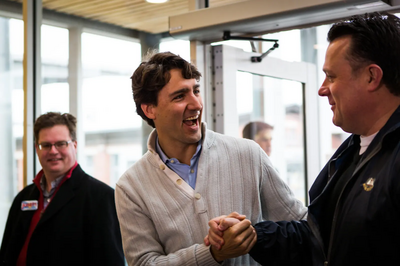Lessons from Canada for the Liberal Democrats
DMP
by Dr Mark Pack
27 Oct 2015
The sweeping victory from third place for Canada's Liberal Party has raised spirits in the Liberal Democrats. As with the tale of Dutch sister party D66's recovery from coalition disaster, the Canadian Liberals offer hope for the future of liberalism in the UK.
Here are six of the lessons Liberal Democrats should learn:
- Recovery isn't inevitable. Yes, this time the Liberals recovered. But it wasn't inevitable - as their previous failed attempts at recovery have shown.
- Small issues can be potent symbols. The question of what people wear at citizenship ceremonies is in many ways a minor point of detail, but it also became a hugely important political symbol - with the Canadian Conservative hard-line approach to the wearing of a niqab at citizenship ceremonies taking the Conservatives back to the hard right, opening up political space for liberals. As with Paddy Ashdown's success in carving out a reputation for the Liberal Democrats when he was leader courtesy of the issue of UK passports for Hong Kong residents, such issues can be politically potent for what they say about your values.
- Economic credibility matters - and is a long-term project. The attempts by the other opposition party, the NDP, to acquire economic credibility by abhorring deficits late in the electoral cycle back-fired. As with Labour's late moves in the UK before the 2015 general election, not only was it too little, too late but it also damaged the party more widely as it was left with the worst of both worlds, looking both weak on economics and unsure of its values. The Liberals, however, benefited from economic credibility that reflects their underlying values - a cautious move towards borrowing to invest in the face of slow economic growth but a federal budget which had just moved into surplus.
- Appeal to the mainstream. The Liberal policies of legalise marijuana, electoral reform and accepting more refugees are all policies to put a smile on the face of Liberal Democrats. But not the centrepiece message and tax reform - tax the very wealthiest more, but only the very wealthiest - and use the revenue to cut taxes for the middle class, not the poorest. Different politics and different social needs mean the Lib Dems shouldn't be bound to copy the details precisely but the broad message is an important one - appealing to the mainstream voter as well as the niche voter, and doing so in a way that is presented as being the best for all of Canada, not as being a matter of class (or wealth) envy.
- Innovative approaches to membership are central to rebuilding. Part of the previous Conservative recovery from electoral disaster in Canada came from a leadership contest where the candidates had access to lists of ex-members, fuelling the organisational rebirth of their party. This time for the Liberals it was the creation of a new class of 'supporter', giving them the right to vote for party leader and communicating heavily with them digitally. For the British political context, the lesson is one about creating a 'Friends of the Lib Dems' scheme.
- Grassroots campaign tactics and techniques matter - but only so far. Both the Canadian Liberals and the British Liberal Democrats use the same election database (called Connect in the UK). The Liberals, however, are in majority government whilst the Liberal Democrats need 318 gains in May 2020 to be in the same place. Grassroots campaigning is only part of the story, as US politics also teaches us.
